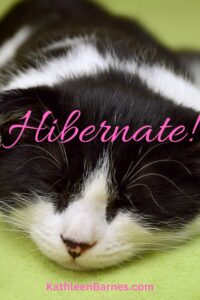 As the hubbub of the holidays passes, this is a great time for self-care.
As the hubbub of the holidays passes, this is a great time for self-care.
Yeah, yeah, I know you’ve heard about self-care before. You think your life is too busy to take good care of yourself. Actually, your life is too busy not to take care of yourself.
Self-care is important and perhaps never more important than now that most of the holiday action is over. Our agrarian ancestors took this time of year to sleep more, eat less and sit by warm fires telling stories so they would have the vigor to plant, grow and harvest their crops the rest of the year.
We need to decompress and what better time than now?
I have a dear friend who has entered what she calls “hibernation,” usually right around the Winter Solstice (Dec. 21) and ending around what most of society calls Groundhog Day in early February, when the days become noticeably longer.
It’s natural to sleep longer when night falls earlier and to take some rest from the general busy-ness of our lives.
Technically, humans do not hibernate like bears, but slowing down our bodies and, more importantly, our busy schedules, in the darkest and coldest time of the year, has a host of positive effects on the human body.
But maybe we can physically hibernate, at least a little. A recent article in the journal The New Scientist cites research confirming that our ancestors probably did go into a state of more sleep and less activity in the deep of winter, especially when food supplies were scarce.
“Mounting evidence suggests that many non-hibernating mammals retain an ability to enter reduced-energy states, including through dormant brain-signaling pathways that slow metabolism,” says an article in the Oct. 22, 2022 edition.
What does that mean?
Researchers suggest a dramatic slowing of physical and mental activity during the coldest months could treat heart disease and help us live longer lives.
I can’t help myself from quoting extensively from an article published in the British Medical Journal in 2000 about a peasant tribe in the Pskov Government, in far northwestern Russia:
“Not having provisions enough to carry them through the whole year, they adopt the economical expedient of spending one half of it in sleep. This custom has existed among them from time immemorial. At the first fall of snow, the whole family gathers round the stove, lies down, ceases to wrestle with the problems of human existence, and quietly goes to sleep. Once a day, everyone wakes up to eat a piece of hard bread, of which an amount sufficient to last six months has providently been baked in the previous autumn. When the bread has been washed down with a draught of water, everyone goes to sleep again. The members of the family take it in turn to watch and keep the fire alight. After six months of this reposeful existence, the family wakes up, shakes itself, goes out to see if the grass is growing, and by-and-by sets to work at summer tasks.”
Of course, our modern life doesn’t allow us to be like the Pskov peasants. We have jobs and kids and “promises to keep and miles to go before we sleep” (homage to Robert Frost), but at this time of the year, consider slowing down everything you can slow down.
Here are a few suggestions:
Decline social invitations: In our society, social invitations almost inevitably involve eating and drinking more than our bodies really need. Of course, we can’t survive on a piece of hard bread and a sip of water every day, but it’s a great time to take a break from the incessant chatter and omnipresence of food.
Re-think your food: Somehow we got the idea that we need more and heavier food in the winters. It’s not true since physical activity is usually diminished at this time of year. I love soup and often make a large pot of simple broth-based vegetable soup in my Instant Pot. We can eat it for days. It’s filling and warm and comforting, but also low in calories. This is a great time to cook ahead so you can conserve energy for more important things like reading a book in front of your fireplace while sipping a hot cup of tea.
Pause shopping: Being in stores is a stressor. There is a cacophony of bad music, announcements and inconsiderate fellow customers. How much shopping (even for essentials like food) do you really need to do? Can you take a shopping break? Do you have holiday leftovers in your freezer? Can you plan ahead and be sure the toilet paper and other necessities are stockpiled? Can you order online or for delivery?
Turn off the TV (and the radio and your devices): The constant mental “noise” caused by all sorts of technology is a huge stressor. Much of the time, we are probably unaware of the noise and perhaps we’re even addicted to it. Give yourself a break. Do what you must and let the rest go. For me, this means convincing dear hubby to turn off the news except for about an hour a day. We’ll see how that goes. LOL. Turn on some soothing music to bring family members into your hibernation zone. They may forget about their own personal noise.
Indulge yourself: That soothing music may be just what you need to do instead of dusting the tabletops or re-organizing the junk drawer. Maybe you can even afford a weekend alone, a massage or just some special calming tea.
This is my pledge for 2023: I will slow down and sip the tea and give myself a break. I know I will emerge from my “hibernation” refreshed and renewed. I hope you’ll join me.








AWESOME NEWSLETTER HAPPY NEW YEAR KATHLEEN…2023***
BEST REGARDS, VICTORIA IN TEXAS